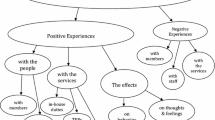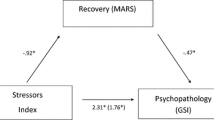Abstract
Peer-delivered services for individuals with psychiatric conditions are becoming an established part of the mental health workforce. Given the growing focus on evidence-based supported employment, peer specialists are often assisting individuals who are choosing, getting, or keeping employment. As part of a larger randomized clinical trial examining the effectiveness of an innovative intervention called vocational peer support, 13 semi-structured qualitative interviews were conducted to examine how recipients perceived peer support, and whether or how it was useful for pursuing vocational goals. A thematic analysis approach was utilized for identifying major themes and sub-themes. Results suggest that a key factor in the effectiveness of vocational peer support is the identification with another individual’s “lived experience,” which then promotes engagement and a sense of normalcy. Vocational peer support may be particularly useful for individuals with psychiatric disabilities wishing to pursue a vocational goal.
Similar content being viewed by others
References
SAMHSA-HRSA Center for Integrated Health Solutions. Peer Providers. Substance Abuse and Mental Health Services Administration. Available online at https://www.integration.samhsa.gov/workforce/team-members/peer-providers. Accessed on November 6, 2017.
Center for Peer Support. MHA National Certified Peer Specialist Certification. Mental Health America. Available online at http://www.mentalhealthamerica.net/mha-national-certified-peer-specialist-certification-get-certified. Accessed on November 6, 2017.
Center on Integrated Health Care and Self-Directed Recovery. National Overview of Peer Support Training and Certification Programs. University of Illinois at Chicago. Available online at https://www.center4healthandsdc.org/map-of-national-peer-training-programs.html. Accessed on November 6, 2017.
Centers for Medicare & Medicaid Services. Letter to Provide Guidance to States Interested in Peer Support Services Under the Medicaid Program. U.S. Department of Health and Human Services. Available online at https://downloads.cms.gov/cmsgov/archived-downloads/SMDL/downloads/SMD081507A.pdf. Accessed on November 6, 2017.
Davidson L, Chinman M, Sells D, et al. Peer Support among Adults with Serious Mental Illness: A Report from the Field. Schizophrenia Bulletin. 2005;32(3):443–450.
Fuhr DC, Salisbury TT, Silva MJD, et al. Effectiveness of Peer Delivered Interventions for Severe Mental Illness and Depression on Clinical and Psychosocial Outcomes: A Systematic Review and Meta-Analysis. Social Psychiatry and Psychiatric Epidemiology. 2014;49(11):1691–1702.
Lloyd-Evans B, Mayo-Wilson E, Harrison B, et al. A Systematic Review and Meta-Analysis of Randomised Controlled Trials of Peer Support for People with Severe Mental Illness. BMC Psychiatry. 2014;14(39).
Center for Psychiatric Rehabilitation. Systematic Review of Supported Education Literature, 1989–2009. Boston University. Available online at http://www.bu.edu/drrk/research-syntheses/psychiatric-disabilities/supported-education/. Accessed on February 22, 2017.
Pitt V, Lowe D, Hill S, et al. Consumer-Providers of Care for Adult Clients of Statutory Mental Health Services. Cochrane Database of Systematic Reviews. 2013. https://doi.org/10.1007/s00127-014-0857-5.
Rogers ES, Swarbrick M. Peer Delivered Services: Current Trends and Innovations. Psychiatric Rehabilitation Journal. 2016;39(3):193–196.
Cook JA, Copeland ME, Jonikas JA, et al. Results of a Randomized Trial of Mental Illness Self-Management Using Wellness Recovery Action Planning. Schizophrenia Bulletin. 2012;38(4):881–891.
Cook JA, Steigman P, Pickett S, et al. Randomized Controlled Trial of Peer-Led Recovery Education Using Building Recovery of Individual Dreams and Goals through Education and Support (BRIDGES). Schizophrenia Research. 2012;136:36–42.
van Gestel-Timmermans H, Brouwers E, van Essen M, et al. Effects of a Peer-Run Course on Recovery from Serious Mental Illness: A Randomized Controlled Trial. Psychiatric Services. 2012;63(1):54–60.
Russinova Z, Rogers ES, Gagne C, et al. A Randomized Controlled Trial of a Peer-Run Anti-Stigma Photovoice Intervention. Psychiatric Services. 2014;65(2):242–246.
Campbell HS, Phaneuf MR, Deane K. Cancer Peer Support Programs - Do They Work? Patient Education and Counseling. 2004;33(1):3–15.
Corrigan P, Mueser K, Solomon P. Principles and Practice of Psychiatric Rehabilitation, New York: The Guilford Press, 2008.
Johnsen M, Teague G, McDonel Herr E. Common ingredients as a fidelity measure for peer-run programs. In: S Clay, B Schell, PW Corrigan, RO Ralph (Eds). On Our Own, Together: Peer Programs for People with Mental Illness. Nashville: Vanderbilt University Press, 2005, pp. 213–238.
Gidugu V, Rogers ES, Harrington S, et al. Individual Peer Support: A Qualitative Study of Mechanisms of Its Effectiveness. Community Mental Health Journal. 2014;51(4):445–452.
Scanlan JN, Hancock N, Honey, A. Evaluation of a Peer-Delivered, Transitional and Post-Discharge Support Program Following Psychiatric Hospitalisation. BMC Psychiatry. 2017;17(1):307.
Hurley J, Cashin A, Mills J, et al. A Critical Discussion of Peer Workers: Implications for the Mental Health Nursing Workforce. Journal of Psychiatric and Mental Health Nursing. 2016;23(2):129–135.
Vandewalle J, Debyser B, Beeckman D, et al. Peer Workers’ Perceptions and Experiences of Barriers to Implementation of Peer Worker Roles in Mental Health Services: A Literature Review. International Journal of Nursing Studies. 2016; 23:129–135.
Moran GS, Russinova Z, Gidugu V, et al. Benefits and Mechanisms of Recovery among Peer Providers with Psychiatric Illnesses. Qualitative Health Research. 2012;22:304–319.
Johnson G, Magee C, Maru M, et al. Personal and Societal Benefits of Providing Peer Support: A Survey of Peer Support Specialists. Psychiatric Services. 2014;65(5):678–680.
Mulder R, Murray G, Rucklidge J. Common Versus Specific Factors in Psychotherapy: Opening the Black Box. The Lancet Psychiatry. 2017;4(12):953–962.
Tellez JJ, Kidd J. Peer Support Workers: An Untapped Resource in Primary Mental Health Care. Journal of Primary Health Care. 2015;7:84–87.
Cronise R, Teixeira C, Rogers ES, et al. The Peer Support Workforce: Results of a National Survey. Journal of Psychiatric Rehabilitation. 2016;39(3):211–221.
Chinman M, George P, Dougherty RH, et al. Peer Support Services for Individuals with Serious Mental Illnesses: Assessing the Evidence. Psychiatric Services. 2014;64(4):429–441.
Community Inclusion Resources. Results from a National Survey of Certified Peer Specialist Job Titles and Job Descriptions: Evidence of a Versatile Behavioral Health Workforce. Temple University Collaborative. Available online at http://tucollaborative.org/pdfs/Toolkits_Monographs_Guidebooks/peer_support_consumer_run_services_peer_specialists/Results_from_a_National_Survey_of_CPS_Job_Titles_and_Descriptions.pdf. Accessed on January 30, 2017.
Community Inclusion Resources. Certified Peer Specialist Training Programs. Temple University Collaborative. Available online at http://tucollaborative.org/wp-content/uploads/2017/04/Certified-Peer-Specialist-Training-Program-Descriptions.pdf. Accessed on January 30, 2017.
Bond GR, Drake RE. Making the Case for IPS Supported Employment. Administration and Policy in Mental Health and Mental Health Services Research. 2012;41(1): 69–73.
Marshall T, Goldberg RW, Braude L, et al. Supported Employment: Assessing the Evidence. Psychiatric Services. 2014;65(1):16–23.
Disability Research. Mental Health Treatment Study: Final Report, July 2011. Social Security Administration. Available online at https://www.ssa.gov/disabilityresearch/documents/MHTS_Final_Report_508.pdf. Accessed on January 30, 2017.
Cook JA, Leff HS, Blyler CR, et al. Results of a Multisite Randomized Trial of Supported Employment Interventions for Individuals with Severe Mental Illness. Archives of General Psychiatry. 2005;62(5):505.
Cook, JA., Mulkern, G, Grey, D, et al. Effects of Unemployment Rate on Vocational Outcomes in a Randomized Trial of Supported Employment for Individuals with Severe Mental Illness. Journal of Vocational Rehabilitation. 2006:25(2):71.
Braun V, Clarke V. Using Thematic Analysis in Psychology. Qualitative Research in Psychology. 2006;3(2):77–101.
Lincoln Y, Guba E. Establishing Dependability and Confirmability in Naturalistic Inquiry Through an Audit. Paper presented at the Annual Meeting of the American Educational Research Association. New York, New York, March 19–23, 1982.
Henretty JR, Currier JM, Berman JS, et al. The Impact of Counselor Self-Disclosure on Clients: A Meta-Analytic Review of Experimental and Quasi-Experimental Research. Journal of Counseling Psychology. 2014;61(2):191–207.
Cabral L, Strother H, Muhr K, et al. Clarifying the Role of the Mental Health Peer Specialist in Massachusetts, USA: Insights from Peer Specialists, Supervisors and Clients. Health & Social Care in the Community. 2013;22(1):104–112.
Fredrickson BL. The Role of Positive Emotions in Positive Psychology: The Broaden-and-Build Theory of Positive Emotions. American Psychologist. 2001;56(3):218–226.
Solomon P. Peer Support/Peer Provided Services Underlying Processes, Benefits, and Critical Ingredients. Journal of Psychiatric Rehabilitation. 2004;27(4):392–401.
Clay S. About us: What we have in common. In: S Clay, B Schell, PW Corrigan, RO Ralph (Eds). On Our Own, Together: Peer Programs for People with Mental Illness. Nashville: Vanderbilt University Press, 2005, pp. 3–16.
Rogers CR. The Characteristics of a Helping Relationship. Sacramento: California State Department of Education, 1958.
Walker G, Bryant W. Peer Support in Adult Mental Health Services: A Metasynthesis of Qualitative Findings. Journal of Psychiatric Rehabilitation. 2013;36(1):28–34.
Austin E, Ramakrishnan A, Hopper K. Embodying Recovery: A Qualitative Study of Peer Work in a Consumer-Run Service Setting. Community Mental Health Journal. 2014;50(8):879–885.
Zirkel S. Is There a Place for Me? Role Models and Academic Identity among White Students and Students of Color. Teachers College Record. 2002;104(2):357–376.
Nicolellis D, Legere L. Vocational Peer Support Training Program: Trainee Handbook and Toolkit. Boston: Boston University Center for Psychiatric Rehabiliation, 2015.
Acknowledgements
This study was conducted with support from the National Institute of Disability, Independent Living and Rehabilitation Research and the Substance Abuse and Mental Health Services Administration, both within the US Health and Human Services (grant no. 90RT5033 and 90AR5018). Endorsement is not implied.
Author information
Authors and Affiliations
Corresponding author
Ethics declarations
All procedures and materials, including recruitment flyers and the interview guide, were approved by the Boston University Institutional Review Board.
Conflict of Interest Statement
The authors declare that they have no conflicts of interest.
Rights and permissions
About this article
Cite this article
Balogun-Mwangi, O., Rogers, E.S., Maru, M. et al. Vocational Peer Support: Results of a Qualitative Study. J Behav Health Serv Res 46, 450–463 (2019). https://doi.org/10.1007/s11414-017-9583-6
Published:
Issue Date:
DOI: https://doi.org/10.1007/s11414-017-9583-6




